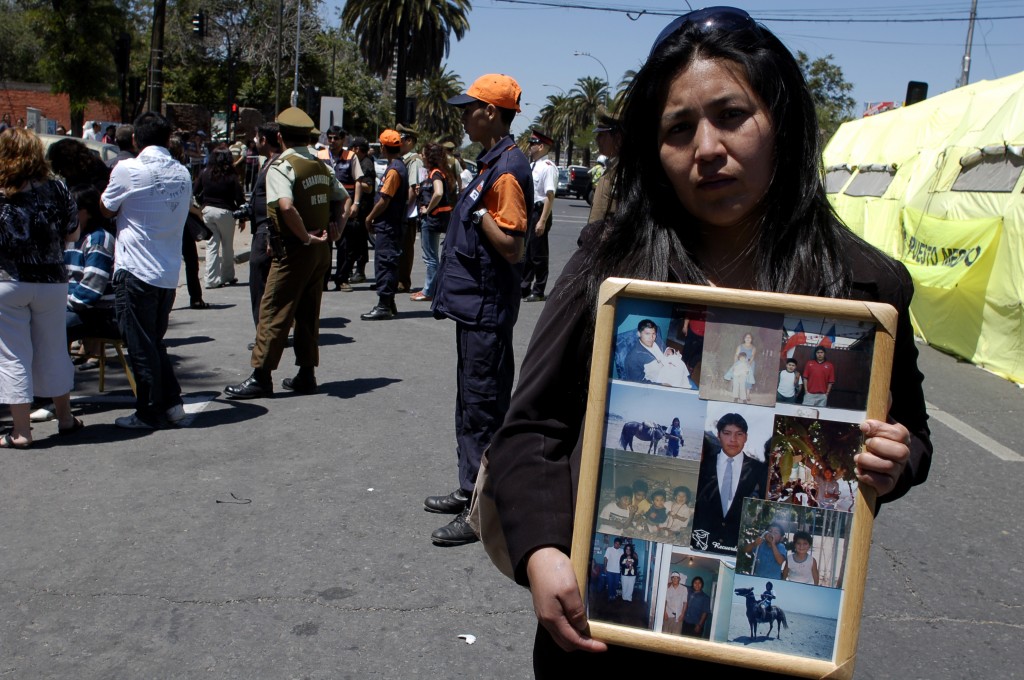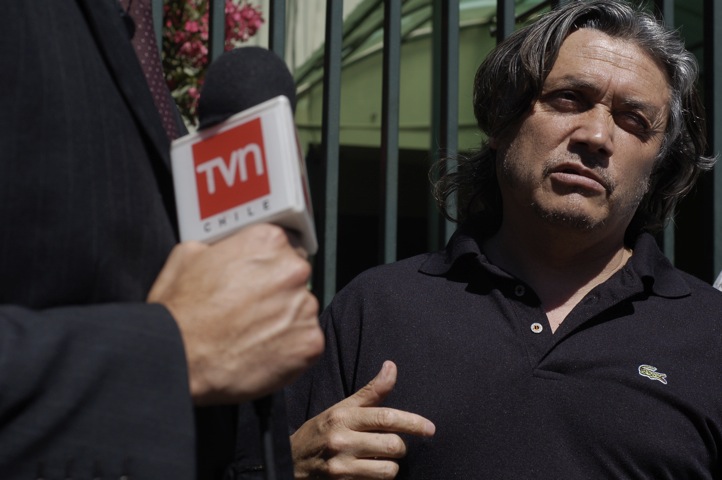
Relatives of the prisoners died in a fire in the jail of San Miguel, wait outside the Legal Medical Service for DNA tests to recognize family members who died in the fire. Santiago, Chile. 09/12/2010. Photo by Rodrigo Daniel Selles Ferres. Copyright © Demotix
Social network users have responded with anger to a fire in the San Miguel prison, in San Miguel, Santiago, Chile, in which more than 80 prisoners died and more than 20 were seriously injured when their cellblock caught fire.
Growing protests [es] and criticism [es] of insensitive press reports as well as strongly voiced opinions over prisoner conditions have stirred up debate over prison conditions and human rights.
Overcrowding and the violation of human rights
Chilean press reports state that the UN High Commission for Human Rights requested access [es] to prisons in Chile to assess prisoner welfare. Chile is one of five countries in the world with the highest number of prisoners per capita. The blaze at San Miguel prison has highlighted [es] the deteriorating state of Chile’s prison system.
Ahora todos sorprendidos con el nivel de hacinamiento en las cárceles en Chile, que onda? Cuando ha sido diferente?? #Carcelsanmiguel
Victor Madariaga (@vmadariaga) comments on the “gendarmería,” the penal institution:
@halconmatinal con lo duro que parece, la fam de las víctimas de #carcelsanmiguel dicen la verdad respecto a la indiferencia de gendarmería
But Jorge Santander (@jorge_santander) has a different opinion:
Y ahora, los familiares agarran a piedrazos a carabineros, amparados en la desesperacion… patetico #carcelsanmiguel
The topic of overcrowding has resulted in a debate on social networking sites about the privatisation [es] of prisons in Chile. Blog de Hermongenes [es] states,
El sistema carcelario chileno es un “juego de suma negativa”, porque en él todos pierden.
Primero, se dice que los presos “pagan su deuda con la sociedad”. No es verdad. No pagan nada. Son castigados, es verdad, pero lo único positivo que resulta de ello para la sociedad es un discutible efecto ejemplarizador de la sanción, muy difícil de cuantificar.
The prison system in Chile is a losing game, because everyone loses out.
People say that prisoners “pay their debt to society”. But this isn’t true. They pay nothing. They are punished, that’s true, but prison only serves as an example to others and its effect is debatable and very difficult to quantify.
Ariel Zúliga in Violencia y Control Social [es] also comments on the case:
La fiscal de la Corte Suprema Mónica Maldonado, hace más de diez años que viene expidiendo informes en donde se menciona que en nuestras cárceles no existen las condiciones mínimas para el respeto de los derechos humanos; se tortura de modo sistemático en nuestros penales. Hace cinco años, a propósito de uno de estos informes y de denuncias individuales el juez de garantía Daniel Urrutia clausuró la penitenciaría de Santiago y ordenó que se liberara a los presos por estar siendo torturados con las condiciones carcelarias; asimismo se negó a encarcelar más internos pues los recintos ya estarían colapsados.
Critical of insensitivity
Carlos Ruiz Báez in the blog Obervatodo [es] gives his view on another side to this story:
Un panorama de una frialdad increíble, y en muchos casos, derechamente de crueldad. En las redes sociales el tema era ampliamente debatido, pero la tónica para muchos era alegrarse de la muerte de estas 81 personas. “Eran puros flaytes [termino despectivo para personas de clase baja, vulgar o de poca educación]”, “81 problemas menos”, “Lo siento por las familias, pero ellos se lo buscaron”. La red estaba llena de este tipo de comentarios.
Ignacio Bugueño V. (@ibugueno) calls for some sensitivity:
Dejemos de politizar las muertes porfa, aquí murió gente y hay que hacer algo para que no muera más gente. Listo. Nada más. #carcelsanmiguel
The blog, De La Republica [es] (@delarepublica) is self-critical, stating on Twitter:
Mientras nuestro discurso sea que el reo se merece las penas del infierno y que sus acciones no tienen contexto, lo de hoy se repetira.
Mª Fernanda Moraga V (@FitaBlu) says [es]:
Ahí quedó la solidaridad chilena que se vio n la Teletón. Ahora se ve n su esplendor c/ gente celebrando la muerte de otros #carcelsanmiguel
The way the Chilean press reported on the incident has drawn both criticism and praise from social media platforms. Paulina Maturana (@PaliMaturana):
Como atacan a los periodistas por Dios, es la única forma de estar informados. Lo que hace la desesperación ! #carcelsanmiguel
Javier Venegas (@JavierVene) says [es]:
horrible “el espectaculo” que esta haciendo la television sobre esta tragedia #carcelsanmiguel la entrega de infrmcon tiene q ser rsponsable
Carito Rojas (@publicarito) also comments [es]:
en fin, que lata por las familias, pero si no ubieran estado en la #carcelsanmiguel no tendrian nada que lamentar
However, Pablo Zúñiga (@pablo_zuniga) poses the question [es]:
me pregunto si la gente que comenta desde su burbuja conocerá a algún (ex) reo, si ya hablado con alguno de ellos. #carcelsanmiguel
Claudia Mancilla C (@CLauDia_CMC) asks how much television [es] is making from the tragedy:
En horario Prime Camiroaga (vestido de luto) entrevista a madre de 2 reos fallecidos en #carcelsanmiguel – “Todo por el Rating?”
Commentaries on the blaze keep on coming, more than just news, the fire at the San Miguel prison has shown a country not only at odds over order and human rights but also divided over what it means to be part of Chilean society.








2 comments